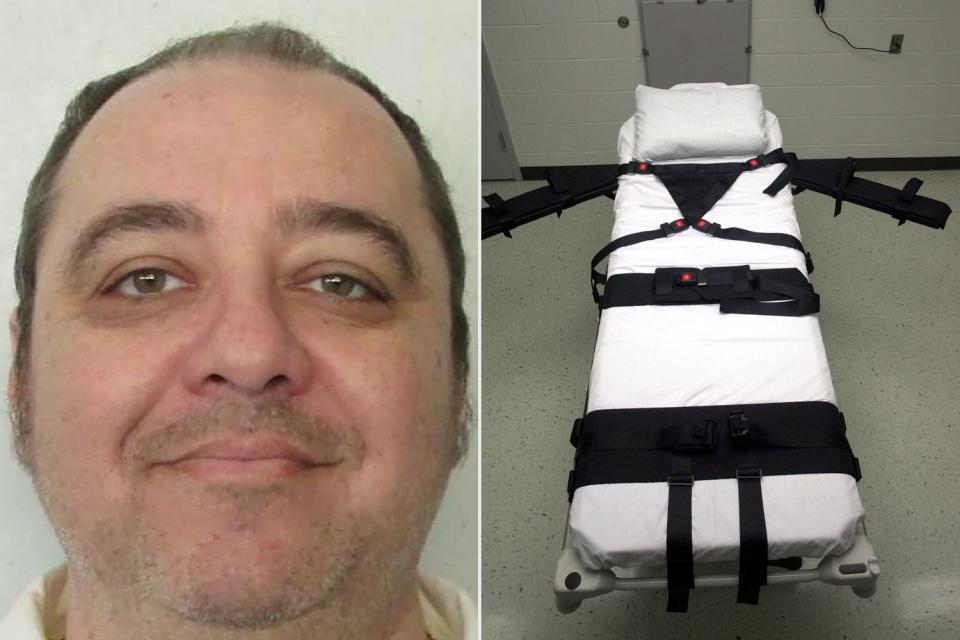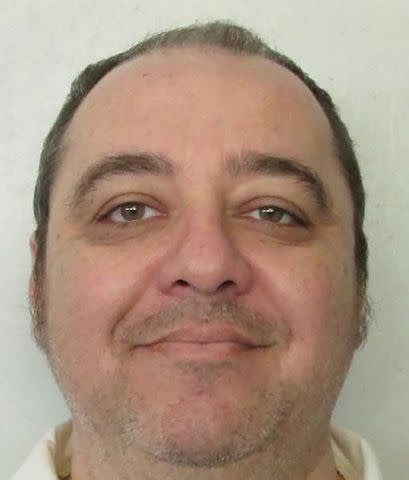Alabama Can Become First State to Execute Inmate with Nitrogen Gas, State's Supreme Court Rules
In a 6-2 decision, the Alabama Supreme Court determined the method could be tried on death row inmate Kenneth Eugene Smith

Alabama Department of Corrections via AP, AP Photo/Dave Martin
L: Kenneth Eugene Smith; R: Holman Correctional Facility's lethal injection chamberAlabama’s death row inmate, Kenneth Eugene Smith, could likely become the first person executed by nitrogen hypoxia, an execution procedure never before tried.
The state’s all-Republican court voted 6-2 without comment Wednesday, granting Alabama Attorney General Steve Marshall’s most recent request for Smith’s execution warrant, the Associated Press reports.
Although the order did not require that Smith be executed with pure nitrogen, per the AP, Marshall’s request specified in court filings that he planned to utilize the new method.
Alabama, Oklahoma and Mississippi are the only states that have authorized nitrogen hypoxia for executions, according to the AP. But no state has actually gone forward with the procedure, which forces pure nitrogen into the inmate's lungs while cutting off the oxygen supply, per the AP.
Related: South Carolina Begins Offering Firing Squad Executions for Death Row Inmates, Now 1 of 4 States
In theory, the procedure is painless — but its true effects are unknown.
Smith’s lawyers, Robert Grass and Andrew Johnson denounced what they termed an “experimental, never-before-used method” in a joint statement reported by AL.com.

Andi Rice/Bloomberg via Getty
Alabama State Capitol in Montgomery, Ala.Smith, who is currently awaiting his execution at William C. Holman Correctional Facility, has been on death row since January 1990, according to an online file with the Alabama Department of Corrections.
Smith was convicted of the 1988 murder of Elizabeth Dorlene Sennett, the wife of local minister Charles Sennett. At the time, Charles was having an affair and was in substantial debt, according to witness testimony described in a decision affirming Smith’s conviction and “electrocution” filed to the Court of Criminal Appeals of Alabama in 2000, which was reviewed by PEOPLE.
After taking out an insurance policy on his wife, the minister hired out her killing to a group of men including Smith in what was designed to look like “a burglary that went bad,” according to a transcription of Smith’s confession to police that was included in the decision.
Want to keep up with the latest crime coverage? Sign up for PEOPLE's free True Crime newsletter for breaking crime news, ongoing trial coverage and details of intriguing unsolved cases.
So, with the promise of $1,000 going to each man on the job, that March 18, 1988 morning, Smith and his associate, John Forrest Parker, knocked on the Sennett’s door. Once there, they told Elizabeth that her husband – who had arranged to be out of the house until noon – had offered to let them survey his property as prospective hunting grounds.
Elizabeth called her husband to confirm and allowed the men to roam the property — and come inside to use the restroom, Smith later told police.
Once inside, Parker "went into a frenzy,” Smith later told police, noting that the other man beat the woman with his fist and a cane and stabbed her, and that he “never stabbed Mrs. Sennett at all.”
A coroner later found that Elizabeth had died of repeated stabbings — eight times in the chest and once on each side of the neck, according to the appeals decision.
Charles Sennett died by suicide a week after his wife's murder, after police zeroed in on him as a suspect. Parker was executed for the crime in 2010, the AP reports.
Related: Man on Death Row Gets Last-Minute Stay of Execution After Victim’s Sister Advocates for Him
Following Smith’s murder conviction, an Alabama jury later voted 11 to 1 that he be sentenced to life in prison without the possibility of parole, according to the filing. But the judge overrode the jury’s recommendation, sentencing him to death instead.
Twenty inmates in five states have been put to death across the country so far this year, including one from Alabama, according to an execution list updated earlier this month by the Death Penalty Information Center. In July the state executed James Barber, 64, using a three-drug lethal injection.

Alabama Department of Corrections via AP
Kenneth Eugene Smith in undated mug shotSmith was almost executed last November, AL.com reported, but after several hours in which he was tied to a gurney as officials tried to administer a lethal injection, his execution was halted because state workers did not think they could carry out the procedure before the execution warrant expired that midnight.
Related: Arizona Death Row Inmate Walks Free After 29 Years in Prison: 'Finally Coming Home'
State officials later promised the court that they would not execute Smith by lethal injection, per the outlet.
Then, in August, Attorney General Marshall turned to the Alabama Supreme Court to set a new execution date — this time by nitrogen hypoxia.
In a late night Tweet Wednesday, Marshall celebrated the state Supreme Court’s decision enabling Smith’s execution with nitrogen gas.
“Elizabeth Sennett’s family has waited an unconscionable 35 years to see justice served,” Marshall wrote in a post on X, the platform formerly called Twitter. He added: “Though the wait has been far too long, I am grateful that our talented capital litigators have nearly gotten this case to the finish line.”
If Smith is executed by nitrogen hypoxia, Alabama’s protocol for the lethal procedure calls for him to be strapped to a gurney with a mask over his face, AL.com reported. Nitrogen gas would be siphoned through the mask for either 15 minutes or for 5 minutes after an EKG shows his flatline — whichever takes longer.
Per the outlet, Governor Kay Ivey must set the execution date within 30 days from the court’s decision.
For more People news, make sure to sign up for our newsletter!
Read the original article on People.


